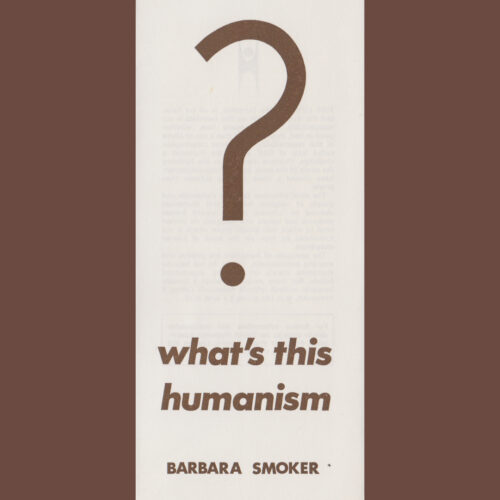

The principles of humanism are positive and exacting commitments. People do not become Humanists merely on rejecting supernatural beliefs. But many people do adopt a broadly humanist outlook without necessarily calling it humanism, or in fact giving it a label at all.
‘What’s This Humanism’ was a pamphlet written by Barbara Smoker for the British Humanist Association (now Humanists UK) in around 1970. It gives a concise introduction to the humanist philosophy, and what it means to live a life based on humanist values.
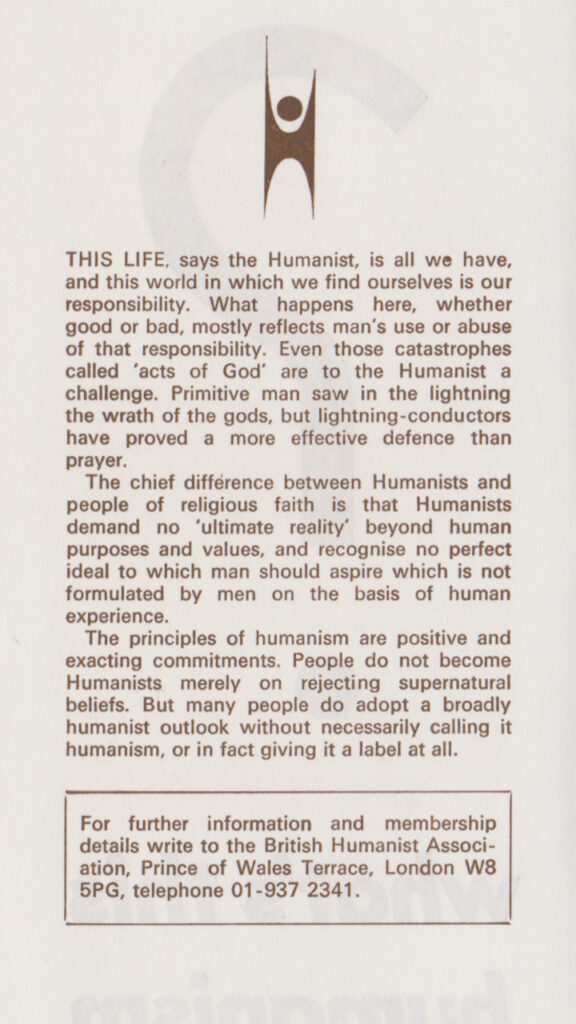
THIS LIFE, says the Humanist, is all we have, and this world in which we find ourselves is our responsibility. What happens here, whether good or bad, mostly reflects man’s use or abuse of that responsibility. Even those catastrophes called ‘acts of God’ are to the Humanist a challenge. Primitive man saw in the lightning the wrath of the gods, but lightning-conductors have proved a more effective defence than prayer.
The chief difference between Humanists and people of religious faith is that Humanists demand no ultimate reality’ beyond human purposes and values, and recognise no perfect ideal to which man should aspire which is not formulated by men on the basis of human experience.
The principles of humanism are positive and exacting commitments. People do not become Humanists merely on rejecting supernatural beliefs. But many people do adopt a broadly humanist outlook without necessarily calling it humanism, or in fact giving it a label at all.
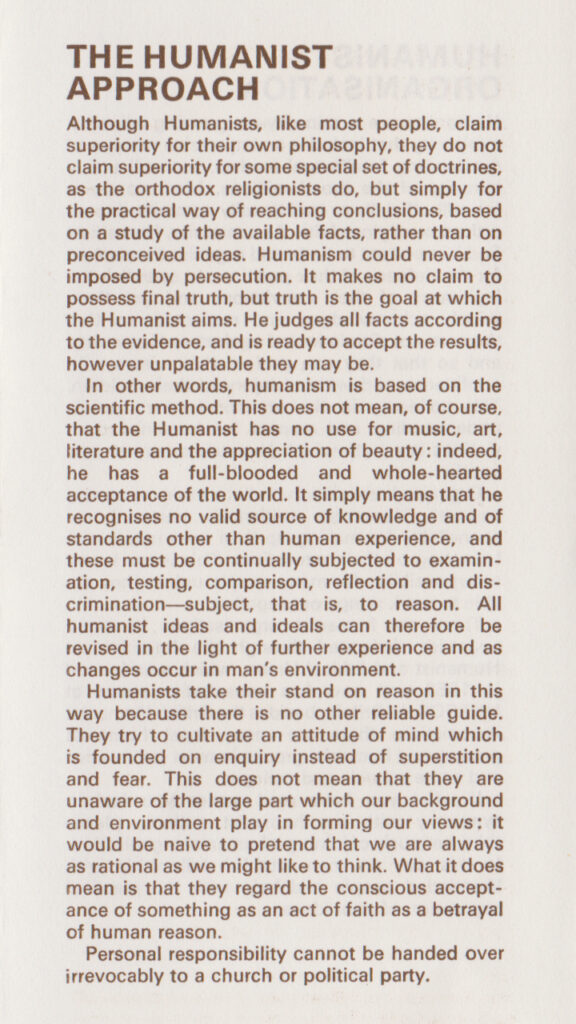
THE HUMANIST APPROACH
Although Humanists, like most people, claim superiority for their own philosophy, they do not claim superiority for some special set of doctrines, as the orthodox religionists do, but simply for the practical way of reaching conclusions, based on a study of the available facts, rather than on preconceived ideas. Humanism could never be imposed by persecution. It makes no claim to possess final truth, but truth is the goal at which the Humanist aims. He judges all facts according to the evidence, and is ready to accept the results, however unpalatable they may be.
In other words, humanism is based on the scientific method. This does not mean, of course, that the Humanist has no use for music, art, literature and the appreciation of beauty: indeed, he has a full-blooded and whole-hearted acceptance of the world. It simply means that he recognises no valid source of knowledge and of standards other than human experience, and these must be continually subjected to examination, testing, comparison, reflection and discrimination—subject, that is, to reason. All humanist ideas and ideals can therefore be revised in the light of further experience and as changes occur in man’s environment.
Humanists take their stand on reason in this way because there is no other reliable guide. They try to cultivate an attitude of mind which is founded on enquiry instead of superstition and fear. This does not mean that they are unaware of the large part which our background and environment play in forming our views: it would be naive to pretend that we are always as rational as we might like to think. What it does mean is that they regard the conscious acceptance of something as an act of faith as a betrayal of human reason.
Personal responsibility cannot be handed over irrevocably to a church or political party.
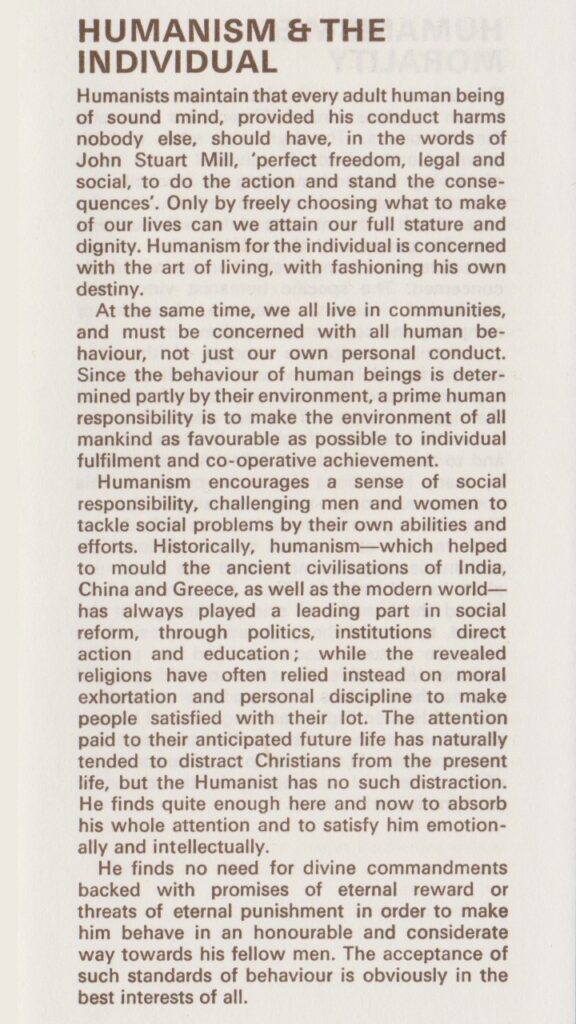
HUMANISM & THE INDIVIDUAL
Humanists maintain that every adult human being of sound mind, provided his conduct harms nobody else, should have, in the words of John Stuart Mill, ‘perfect freedom, legal and social, to do the action and stand the consequences’. Only by freely choosing what to make of our lives can we attain our full stature and dignity. Humanism for the individual is concerned with the art of living, with fashioning his own destiny.
At the same time, we all live in communities, and must be concerned with all human behaviour, not just our own personal conduct. Since the behaviour of human beings is determined partly by their environment, a prime human responsibility is to make the environment of all mankind as favourable as possible to individual fulfilment and co-operative achievement.
Humanism encourages a sense of social responsibility, challenging men and women to tackle social problems by their own abilities and efforts. Historically, humanism—which helped to mould the ancient civilisations of India, China and Greece, as well as the modern world— has always played a leading part in social reform, through politics, institutions direct action and education; while the revealed religions have often relied instead on moral exhortation and personal discipline to make people satisfied with their lot. The attention paid to their anticipated future life has naturally tended to distract Christians from the present life, but the Humanist has no such distraction. He finds quite enough here and now to absorb his whole attention and to satisfy him emotionally and intellectually.
He finds no need for divine commandments backed with promises of eternal reward or threats of eternal punishment in order to make him behave in an honourable and considerate way towards his fellow men. The acceptance of such standards of behaviour is obviously in the best interests of all.
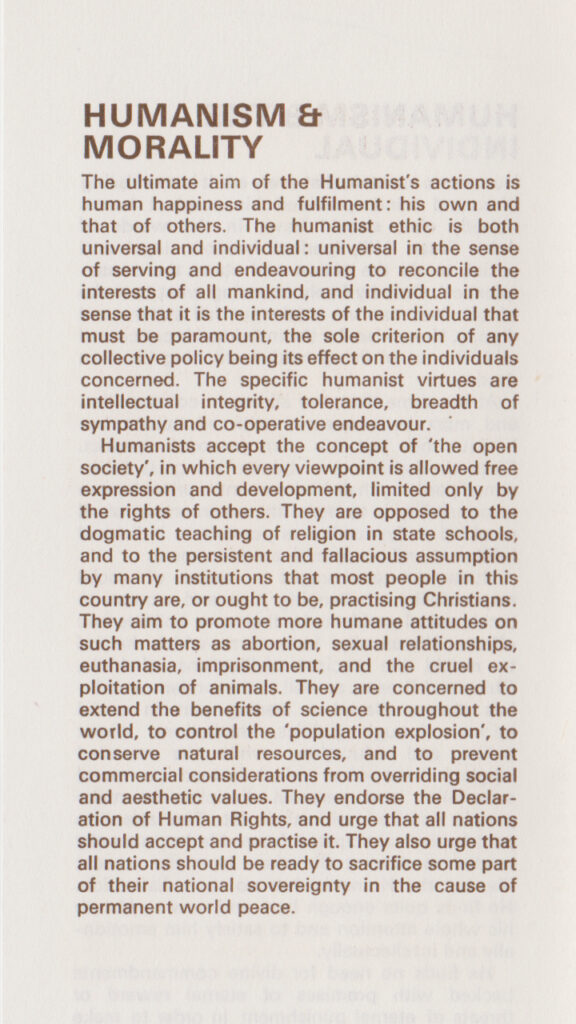
HUMANISM & MORALITY
The ultimate aim of the Humanist’s actions is human happiness and fulfilment: his own and that of others. The humanist ethic is both universal and individual: universal in the sense of serving and endeavouring to Reconcile the interests of all mankind, and individual in the sense that it is the interests of the individual that must be paramount, the sole criterion of any collective policy being its effect on the individuals concerned. The specific humanist virtues are intellectual integrity, tolerance, breadth of sympathy and co-operative endeavour.
Humanists accept the concept of ‘the open society’, in which every viewpoint is allowed free expression and development, limited only by the rights of others. They are opposed to the dogmatic teaching of religion in state schools, and to the persistent and fallacious assumption by many institutions that most people in this country are, or ought to be, practising Christians. They aim to promote more humane attitudes on such matters as abortion, sexual relationships, euthanasia, imprisonment, and the cruel exploitation of animals. They are concerned to extend the benefits of science throughout the world, to control the ‘population explosion’, to conserve natural resources, and to prevent commercial considerations from overriding social and aesthetic values. They endorse the Declaration of Human Rights, and urge that all nations should accept and practise it. They also urge that all nations should be ready to sacrifice some part of their national sovereignty in the cause of permanent world peace.
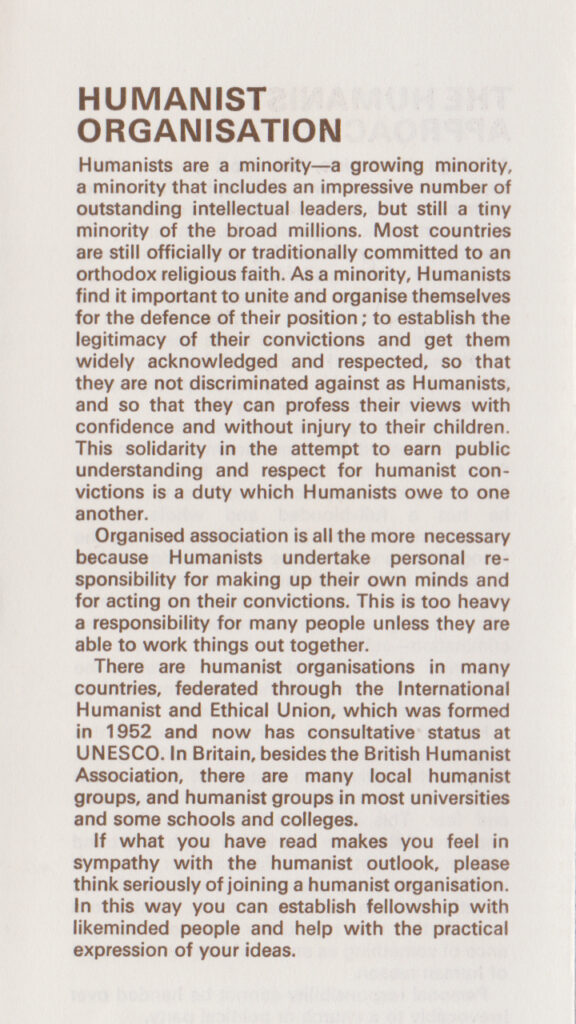
HUMANIST ORGANISATION
Humanists are a minority—a growing minority, a minority that includes an impressive number of outstanding intellectual leaders, but still a tiny minority of the broad millions. Most countries are still officially or traditionally committed to an orthodox religious faith. As a minority, Humanists find it important to unite and organise themselves for the defence of their position; to establish the legitimacy of their convictions and get them widely acknowledged and respected, so that they are not discriminated against as Humanists, and so that they can profess their views with confidence and without injury to their children. This solidarity in the attempt to earn public understanding and respect for humanist convictions is a duty which Humanists owe to one another.
Organised association is all the more necessary because Humanists undertake personal responsibility for making up their own minds and for acting on their convictions. This is too heavy a responsibility for many people unless they are able to work things out together.
There are humanist organisations in many countries, federated through the International Humanist and Ethical Union, which was formed in 1952 and now has consultative status at UNESCO. In Britain, besides the British Humanist Association, there are many local humanist groups, and humanist groups in most universities and some schools and colleges.
If what you have read makes you feel in sympathy with the humanist outlook, please think seriously of joining a humanist organisation. In this way you can establish fellowship with likeminded people and help with the practical expression of your ideas.
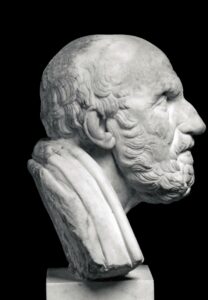
Chrysippus (or Chrysippos) of Soli was a Greek Stoic philosopher. Although Chrysippus believed in fate, divination, and gods, he believed […]

By Mia Nathan Constantly having to combat irrational and dangerous thinking is strenuous and sometimes tedious, but not necessarily boring. […]

Rationalism is… primarily a mental attitude, not a creed or a definite body of negative conclusions. No uniformity of opinions […]

The death of Shaw is to progressive people of the twentieth century what the death of Voltaire must have been […]